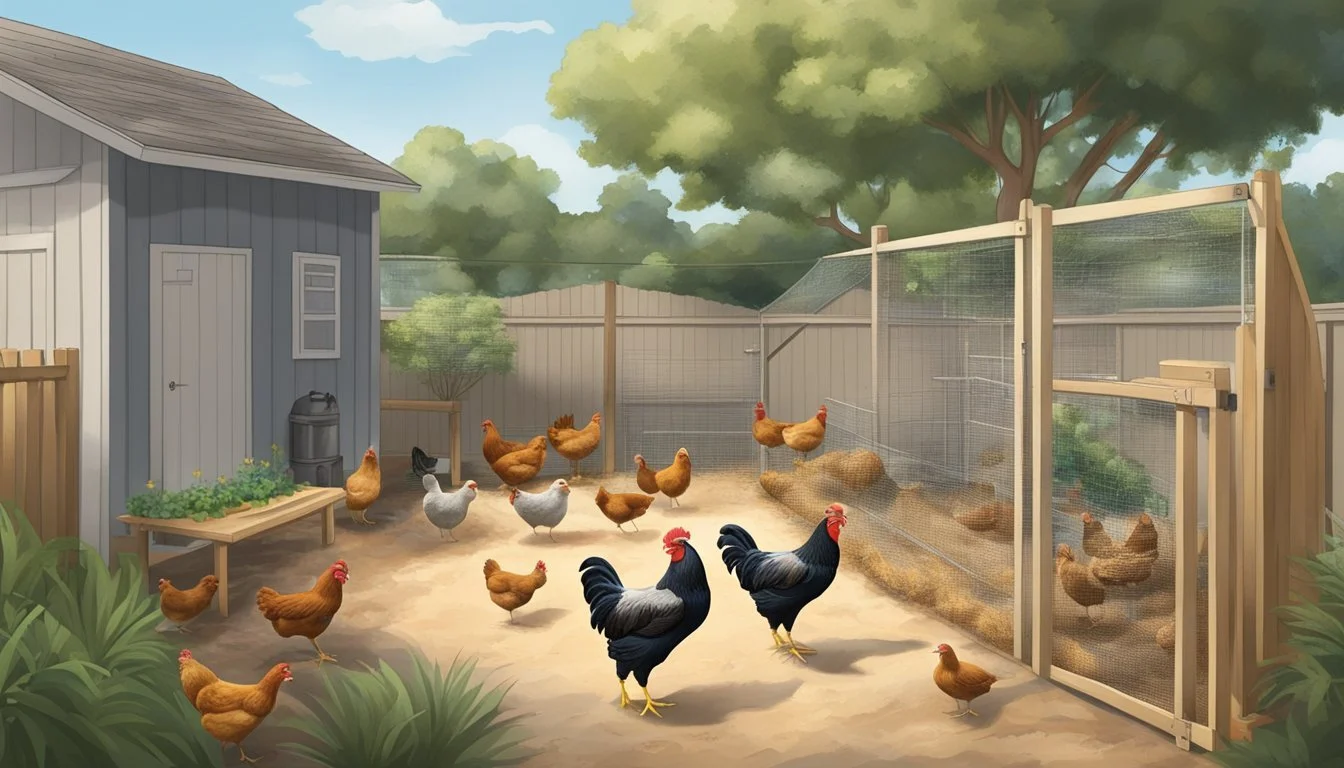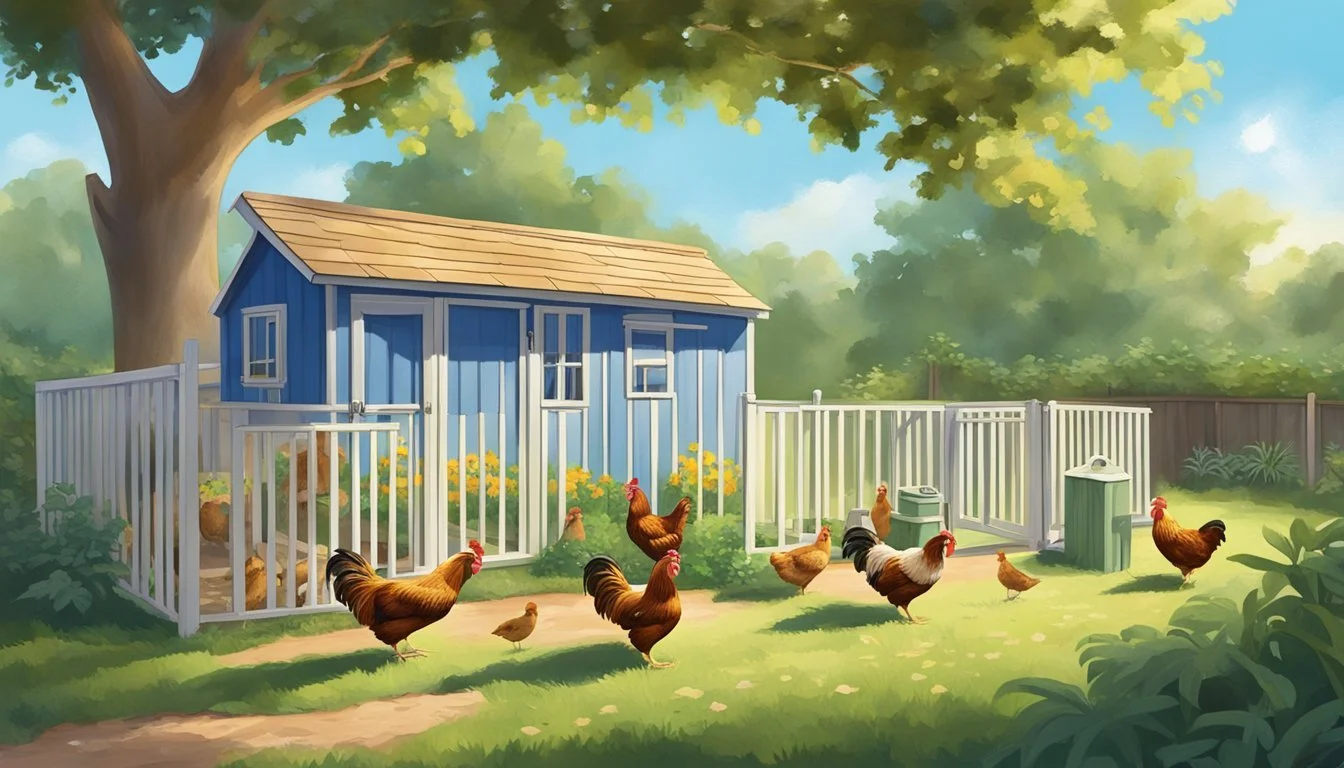Keeping Backyard Chickens in Clearwater, FL
Essential Tips for New Owners
In Clearwater, Florida, embracing the trend of urban homesteading has led to a notable change in the city's ordinances regarding the keeping of backyard chickens. Recognizing the benefits and popularity of this practice, Clearwater's City Council has passed a measure allowing residents of single-family homes to engage in the raising of backyard poultry. This aligns with a growing movement across the nation that acknowledges the value of sustainability and self-sufficiency that backyard chickens can provide.
The city's approval comes with specific guidelines to ensure the harmony and well-being of both the chickens and the community. Residents can keep a capped number of chickens, restricted to hens only, to prevent noise concerns typically associated with roosters. Additionally, the city mandates that coops and runs be maintained within the confinement of an individual's backyard, adhering to cleanliness standards and placement regulations to respect neighboring properties and community aesthetics.
Understanding Local Ordinances and Regulations
Keeping backyard chickens in Clearwater, Florida requires an understanding of various local and state regulations that ensure responsible poultry management and neighborhood harmony.
Overview of Clearwater City Ordinances
In Clearwater, residents living in single-family homes are permitted to keep up to four backyard chickens, based on city ordinances. The implementation of a coop and run is mandatory, and the birds must be kept for personal use only, not for commercial purposes.
Permitting Policies in Pinellas County
Pinellas County overall, including Clearwater, mandates that some municipalities might require permits for keeping backyard chickens. It is crucial to check with the local government. Homeowner Associations (HOAs) may also impose their requirements which can supersede local laws.
No permit required: Clearwater, Dunedin, Largo
Permit required: Gulfport, St. Petersburg
Comparison with Neighboring Cities
Cities like Tampa and St. Petersburg have similar backyard chicken provisions, though specifics can vary. For example, Tampa, which lies in Hillsborough County, allows up to five hens with no roosters, while St. Petersburg requires a permit and has set regulations on coop construction and placement.
Statewide Regulations for Backyard Poultry
While there are no overarching Florida state laws specifically governing backyard poultry, statewide regulations on animal welfare and nuisance apply. It's also important to consider recommendations from the University of Florida regarding best practices for the health and safety of backyard chickens.
Each municipality and county, such as Orlando in Orange County, or Miami, might have distinct approach to backyard poultry, so it is always advised to consult the local Municipal Code. Regulations can vary significantly across the state from more relaxed policies in rural areas to stringent restrictions within urban centers.
Setting Up Your Chicken Coop
When setting up a chicken coop in Clearwater, FL, one must carefully consider the location, design, and protective measures to ensure the health and safety of the backyard chickens.
Choosing the Right Location
The coop should be placed in a well-drained area of the backyard to prevent waterlogging, which can lead to unsanitary conditions and potential health problems for the chickens. It is essential to select a location that provides shelter from direct sun and strong winds while maintaining accessibility for easy cleaning and egg collection.
Coop Design and Size
An appropriate coop design includes sufficient space for the chickens to live comfortably. For Clearwater residents, the proper coop size should offer a minimum of 3 to 4 square feet per bird inside the coop and about 10 square feet per bird in the outdoor run. A coop for four chickens should measure at least 16 square feet with an attached run of 40 square feet to allow for adequate movement and foraging.
Dimensions for Four Chickens:
Coop area: 16 sq ft (minimum)
Run area: 40 sq ft (minimum)
Ensuring Proper Ventilation and Protection
Ventilation is crucial to maintaining air quality and temperature control within the coop. At the same time, coops must be secure to protect chickens from predators such as raccoons and birds of prey. Hardware cloth should be used instead of chicken wire, as it is sturdier and provides better protection. The coop should be kept clean and have easy access to fresh water, which contributes to the overall wellness of the backyard chickens in a single-family home environment.
Daily Care and Management
Effective daily care and management are crucial for maintaining a healthy and productive backyard chicken flock in Clearwater, FL. This section provides specific guidance on feeding, watering, cleanliness, and health management to ensure the well-being of your hens and the quality of their eggs.
Feeding and Watering Essentials
Chickens require a balanced diet to stay healthy and lay quality eggs. They should have constant access to a specifically formulated layer feed, which provides the necessary nutrients. In Clearwater, FL, it’s important to provide plenty of fresh, clean water daily, as heat can increase water consumption.
Feed: Layer feed with 16% to 18% protein content.
Water: Fresh and clean, replace daily to prevent algae and bacteria growth.
Maintaining Cleanliness
Cleanliness is vital in a chicken coop to prevent disease and discourage pests and predators. Regularly removing manure and leftover feed keeps the coop sanitary and reduces the risk of illness.
Coop Cleaning: Weekly removal of manure; full bedding replacement monthly.
Composting: Manure can be added to a composting pile, aiding in garden fertility.
Health Check and Veterinary Care
Daily observation helps in early detection of potential health issues. Chickens should be checked for signs of distress or illness, such as abnormal breathing, lethargy, or a drop in egg production. Establish a relationship with a local veterinarian who is knowledgeable about poultry to address any health concerns promptly.
Daily Checks: Look for changes in behavior or appearance.
Veterinary Care: Regular check-ups and immediate attention to concerning symptoms.
Community and Environmental Concerns
As more residents in Clearwater engage in raising backyard chickens, it is essential to consider the balance between community relations and environmental health. Addressing potential nuisances and managing noise and odors are pivotal to maintaining a harmonious and sustainable urban agricultural practice.
Nuisance and Neighbor Relations
Raising backyard chickens can lead to tension among neighbors if not managed properly. Key concerns include:
Roosters: Clearwater's ordinance does not permit roosters due to their potential for creating noise nuisances. Only hens are allowed.
Property Lines: Coops should be placed considerately, away from neighboring property lines to minimize any nuisance.
Community Dialogue: Engaging in open communication with neighbors can preempt misunderstandings and foster community support.
Noise and Odor Management
Effective noise and odor control is crucial for a healthy coexistence between chickens and the community. Clearwater residents must implement these strategies:
Coop Cleaning: Maintain a regular cleaning schedule to minimize odors.
Frequency Action Daily Remove waste and leftover food. Weekly Change bedding materials. Monthly Conduct a deep clean of the coop.
Noise Monitoring: While hens are less noisy than roosters, they can still cause disturbances.
Potential Cause Mitigation Action Early Morning Laying Design the coop to limit light in the early hours. Distressed Clucking Ensure chickens have enough space, food, and water.
By thoughtfully addressing community and environmental concerns, Clearwater residents can enjoy the benefits of backyard chickens, such as fresh eggs and contributions to sustainability, without compromising the peace and health of the community.
Legal and Ethical Considerations
When keeping backyard chickens in Clearwater, FL, residents must navigate specific legal frameworks regarding the sale of eggs and the slaughtering of chickens, complying with city and county regulations.
Home Business and Selling Eggs
In Clearwater, individuals may consider turning their backyard chicken activities into a home-based business. However, if they decide to sell eggs, it's essential to follow local laws pertaining to fresh eggs sales. One must register as a business and adhere to health and safety standards enforced by local authorities to ensure the eggs are fit for consumption. Sales are often limited to personal use transactions, which are typically small-scale and direct to consumer.
Regulations on Slaughtering
Slaughtered chickens, particularly when conducted within residential areas, are subject to strict regulations. Chickens in Clearwater must be slaughtered on the premises in a humane manner and in accordance with local ordinances that are designed to ensure ethical treatment. Slaughter for personal use is permissible under certain conditions and residents should be aware of these before proceeding. It is important to verify that all practices are up to code to avoid any legal complications.
Additional Poultry Types
When considering the addition of poultry to a backyard setting in Clearwater, FL outside of chickens, residents may think of ducks, geese, turkeys, and peafowl. Each type brings its unique requirements and considerations.
Ducks: Known for their less noisy demeanor compared to chickens, ducks require access to water for swimming. While not a strict necessity, it greatly enhances their quality of life. They are adept at insect control and can be as productive as chickens in terms of egg-laying, depending on the breed.
Geese: Geese serve as excellent 'guard' birds due to their territorial nature. These large birds need more space than chickens or ducks and are particularly fond of grazing, requiring an area with ample grass. Water for bathing is also a consideration for their well-being.
Turkeys: Considered for their meat, turkeys are larger than chickens and require more space. They are social creatures and thrive in a flock. Secure, sturdy roosting areas are necessary to accommodate their size.
Peafowl: Known for their extravagant plumage, peafowl are often kept for ornamental purposes. They are larger birds and need considerable space to roam. Peafowl can be quite vocal, especially during the breeding season, which is an important consideration for urban areas.
Each type of poultry must be housed safely to protect from predators and may require different types of shelters or modifications to coops designed for chickens. Additionally, local ordinances must be checked for regulations specific to the keeping of these birds, as they vary and might not be the same as those for chickens. Residents must ensure their commitment not only to the welfare of the birds but also to maintaining good relationships with neighbors when introducing poultry to their backyard.
Engaging with the Community
Clearwater's decision to allow backyard chickens reflects a collaborative effort among residents, city officials, and local enthusiasts. The dialogue within the community opens various avenues for residents to learn and share their experiences.
Local Chicken Enthusiast Groups
Residents of Clearwater have opportunities to connect with fellow chicken enthusiasts through groups such as Private Facebook Groups. These online communities are flourishing in nearby areas, including Pinellas Park and Tarpon Springs, where members can exchange tips and advice on raising chickens in an urban setting. Chicken Advocates like Tara "Pickles" Penix, who addressed the City Council on the backyard chicken ordinance, often participate in these platforms, advocating for responsible chicken-keeping practices.
Educational Resources and Workshops
The city provides numerous Resources to ensure residents are well-prepared to raise backyard chickens. Council Member Hoyt Hamilton, a proponent of the ordinance, alongside legal guidance from Assistant City Attorney Matthew Mytych, emphasizes the importance of education in maintaining the welfare of the chickens and the community. Workshops may be available, drawing on best practices from places with a long history of backyard poultry like Rural Indiana, covering everything from coop construction to proper chicken care. Additionally, local extension services may be a valuable resource for those seeking direct guidance and learning opportunities.
Frequently Asked Questions
In an effort to provide Clearwater residents with accurate guidelines on keeping backyard chickens, here are some of the most common questions addressed with concise answers.
Permit Application Process
Clearwater residents interested in raising backyard chickens must first obtain a permit. The backyard chicken permit process typically involves submitting an application to the city’s zoning department. It is important to provide all the required documentation as specified in the application to avoid delays. Applications are made available to homeowners of single-family residences who wish to keep chickens on their property.
Number and Types of Chickens Allowed
The city of Clearwater allows residents to keep up to four chickens, but roosters are prohibited due to noise considerations. Bantam Cochins and other small breeds that are less likely to disturb neighbors are preferred. Keeping a number of chickens in line with city regulations ensures that individuals can enjoy their hobby without impacting the community negatively.
Handling Predators and Pests
To safeguard against predators and pests, secure housing is necessary. Chicken coops should be designed to prevent access from predatory animals such as raccoons or foxes. Maintaining cleanliness and proper feeding practices can also deter pests. The city may provide oversight and enforcement to ensure that residents are adhering to practices that keep chickens safe and minimize pest issues.
Conclusion
Residents of Clearwater, Florida, can now relish the distinct benefits of keeping backyard chickens, following the city's ordinance aligning with the urban agriculture movement. They enjoy a steady supply of healthy eggs while forming a bond of companionship with their feathered friends. These birds not only provide nourishment but also contribute organic fertilizer, enhancing garden health and productivity.
The final vote by Clearwater municipalities reflects a progressive stance on urban self-reliance, granting citizens independence in their food sources. However, it is incumbent upon residents to remain vigilant about local regulations to maintain community standards and animal welfare.
Key Considerations for Backyard Chicken Keepers:
Inbox Management: Stay informed through local channels for updates on regulations.
Health Benefits: Enjoy the output of nutritious, farm-fresh eggs.
Companionship: Chickens can offer social interaction and stress relief.
Contribution to Gardens: Utilize chicken waste for an organic garden boost.
By adhering to guidelines and embracing responsible stewardship, inhabitants are poised to optimize the benefits that backyard chickens offer.











